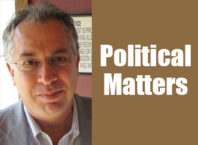 Political Matters motored to Washington, D.C., in June, for the annual conference of the American Jewish Press Association (AJPA). When I’m not writing this column, I edit and publish the American Jewish World, the weekly newspaper of the Jewish community in Minnesota. The AJPA gathering provides an opportunity to meet my colleagues from around the country and compare notes. It’s a difficult time for the newspaper industry, which is dealing with declining readership and revenues.
Political Matters motored to Washington, D.C., in June, for the annual conference of the American Jewish Press Association (AJPA). When I’m not writing this column, I edit and publish the American Jewish World, the weekly newspaper of the Jewish community in Minnesota. The AJPA gathering provides an opportunity to meet my colleagues from around the country and compare notes. It’s a difficult time for the newspaper industry, which is dealing with declining readership and revenues.
The conference involves a lot of seminars, so I spent most of three days in hotel meeting rooms. I did find time to attend a Washington Nationals game in the new $600 million Nationals Park – great ballpark, truly horrible team. On my last afternoon in D.C., I toured the United States Holocaust Memorial Museum. (On my next visit I hope to see the National Museum of the American Indian.)
A small group from the AJPA contingent was treated to a tour of “The
Nazi Olympics: Berlin 1936,” by the exhibition’s curator, historian
Susan Bachrach. The special exhibit, which will be on view through Aug.
17, has a special resonance in the midst of the ongoing controversy
over the 2008 Beijing Olympic Games. There are calls from around the
world to boycott the Beijing Games because of Chinese repression in
Tibet, and the government’s support of the Sudanese regime, which is
waging a campaign of genocide in the province of Darfur.
Past is prologue, as they say. There also were voices urging a boycott
of the Berlin Games, to protest the Nazi regime’s dictatorial and
anti-Semitic policies. The International Olympic Committee (IOC)
awarded the Olympic Games to Berlin in 1931; two years later, Adolf
Hitler became Germany’s chancellor and set about to eliminate all
political opposition. Of course, the Nazis, and their henchmen in other
countries, destroyed two-thirds of European Jewry, six million souls,
including one and half million children. The Nazis’ industrialized
process of mass murder – of Jews, Roma (Gypsies), the physically and
developmentally disabled, and other “undesirables” – epitomizes evil in
the modern world.
“The Nazi Olympics” provides fascinating insights into a period when
sports became a tool of Nazi propaganda, which promoted the doctrine of
“Aryan” racial superiority. Jews, such as Gretel Bergmann, a
world-class high jumper, were expelled from the German Olympic team in
1936. The Nazis wanted to bar all Jewish athletes from the Games, but
backed down in the face of a threatened boycott. Jesse Owens, the great
African American athlete, won four gold medals in Berlin, which belied
Nazi claims of Aryan supremacy; Hitler, faced with the choice of
shaking Owens’ hand or foregoing handshakes with all the winning
athletes, chose the latter option.
While touring the exhibit, I thought about Jim Thorpe (Sac and Fox
Tribe from Oklahoma) the All-American in football at Carlisle
Industrial Indian School, who won the gold in the decathlon and the
pentathlon at the 1912 Olympic Games in Stockholm, Sweden. At the
medals presentation, King Gustav V of Sweden grabbed Thorpe by the hand
and declared: “Sir, you are the greatest athlete in the world.” Thorpe
later described his accomplishment in Stockholm as the proudest moment
in his life. At the ceremony, he simply replied, “Thanks, king.”
Thorpe’s Olympic triumph, however, was short-lived. Six months after
winning his gold medals, Thorpe was charged with taking money to play
baseball in North Carolina several years earlier. (“Pop” Warner also
provided cash to Thorpe when he played at Carlisle.) The Amateur
Athletic Union and the American Olympic Committee asked Thorpe to
return the medals he won in Stockholm and erased his name from the
record books.
In the case of the black athletes at the 1936 Berlin Olympics, they
were feted by the Germans then returned to an America where “Jim Crow,”
racial segregation, was still pervasive. It’s nice to think of the
Olympics as an arena of pure athletic competition; but politics will
intrude again at the Beijing Olympic Games. And Visa, a corporate
sponsor of the Olympics, will feature Jim Thorpe in their advertising
campaign.
Sheila White Eagle
My April column of Political Matters was devoted to honoring the life
of Sheila WhiteEagle, who worked diligently for the betterment of the
Indian community. On June 7, Sheila lost her four-year battle with
breast cancer. She was the director of the St. Paul Area Council of
Churches’ Department of Indian Work program for more than 20 years. The
Council of Churches Web site has a touching memorial to Sheila, in
words and photos, at: www.spacc.org. May her memory be a blessing to
those who knew her and are mourning her loss.




